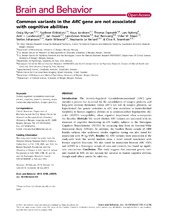| dc.contributor.author | Myrum, Craig | en_US |
| dc.contributor.author | Giddaluru, Sudheer | en_US |
| dc.contributor.author | Jacobsen, Kaya Kvarme | en_US |
| dc.contributor.author | Espeseth, Thomas | en_US |
| dc.contributor.author | Nyberg, Lars | en_US |
| dc.contributor.author | Lundervold, Astri | en_US |
| dc.contributor.author | Haavik, Jan | en_US |
| dc.contributor.author | Nilsson, Lars-Göran | en_US |
| dc.contributor.author | Reinvang, Ivar | en_US |
| dc.contributor.author | Steen, Vidar Martin | en_US |
| dc.contributor.author | Johansson, Stefan | en_US |
| dc.contributor.author | Wibrand, Karin | en_US |
| dc.contributor.author | Le Hellard, Stephanie | en_US |
| dc.contributor.author | Bramham, Clive R. | en_US |
| dc.date.accessioned | 2016-01-12T09:49:09Z | |
| dc.date.available | 2016-01-12T09:49:09Z | |
| dc.date.issued | 2015-09-03 | |
| dc.Published | Brain and Behavior 2015, 5(10) | eng |
| dc.identifier.issn | 2162-3279 | |
| dc.identifier.uri | https://hdl.handle.net/1956/10930 | |
| dc.description.abstract | Introduction: The Activity-Regulated Cytoskeleton-associated (ARC) gene encodes a protein that is critical for the consolidation of synaptic plasticity and long-term memory formation. Given ARC's key role in synaptic plasticity, we hypothesized that genetic variations in ARC may contribute to interindividual variability in human cognitive abilities or to attention-deficit hyperactivity disorder (ADHD) susceptibility, where cognitive impairment often accompanies the disorder. Methods: We tested whether ARC variants are associated with six measures of cognitive functioning in 670 healthy subjects in the Norwegian Cognitive NeuroGenetics (NCNG) by extracting data from its Genome-Wide Association Study (GWAS). In addition, the Swedish Betula sample of 1800 healthy subjects who underwent similar cognitive testing was also tested for association with 19 tag SNPs. Results: No ARC variants show association at the study-wide level, but several markers show a trend toward association with human cognitive functions. We also tested for association between ARC SNPs and ADHD in a Norwegian sample of cases and controls, but found no significant associations. Conclusion: This study suggests that common genetic variants located in ARC do not account for variance in human cognitive abilities, though small effects cannot be ruled out. | en_US |
| dc.language.iso | eng | eng |
| dc.publisher | Wiley Periodicals, Inc | eng |
| dc.rights | Attribution CC BY 4.0 | eng |
| dc.rights.uri | http://creativecommons.org/licenses/by/4.0 | eng |
| dc.subject | Activity-regulated cytoskeleton-associated protein | eng |
| dc.subject | single-nucleotide polymorphism | eng |
| dc.subject | synaptic plasticity | eng |
| dc.title | Common variants in the ARC gene are not associated with cognitive abilities | en_US |
| dc.type | Peer reviewed | |
| dc.type | Journal article | |
| dc.date.updated | 2015-12-22T10:40:30Z | |
| dc.description.version | publishedVersion | en_US |
| dc.rights.holder | Copyright 2015 The Authors. | |
| dc.identifier.doi | https://doi.org/10.1002/brb3.376 | |
| dc.identifier.cristin | 1302963 | |
| dc.subject.nsi | VDP::Matematikk og Naturvitenskap: 400 | en_US |

